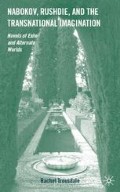Abstract
If Midnight’s Children challenges the idea that individuals can represent a nation, The Satanic Verses goes further, destabilizing not only its characters’ representations but also the very notion that there is an absolute truth to represent. The status of “fact,” of objectively verifiable truth, is assigned in the novel almost entirely to internal, personal experience, while the physical truths central to Nabokov’s novels and even Midnight’s Children become unstable. While Saleem’s insistence on “memory’s truth” in Midnight’s Children marks his unreliability, The Satanic Verses seems to validate Saleem’s position, treating “fact” as provable only through personal experience. Michael Gorra, noting how Saleem asks us to take his autobiography literally, says that Midnight’s Children is “a world without metaphor.”1 In The Satanic Verses, however, proliferating viewpoints render even such subjective literalism difficult because the “incompatible” truths of the novel cannot be reconciled.2 It is easy to call this instability prototypically postmodern. More complicated and productive is the problem of how such postmodern privileging of subjective truths helps Rushdie and his readers construct viable real-world communities, rather than leading—as postmodern narratives like Brett Easton Ellis’s American Psycho (1991) do—to a rejection of meaningful communion and communication.
Access this chapter
Tax calculation will be finalised at checkout
Purchases are for personal use only
Preview
Unable to display preview. Download preview PDF.
Notes
Michael Gorra, After Empire: Scott, Naipaul, Rushdie (Chicago, IL: University of Chicago Press, 1997), 118.
Feroza Jussawalla, “Resurrecting the Prophet: The Case of Salman, the Otherwise,” Public Culture 2, no. 1 (1989): 113.
Satish C. Aikant, “Salman Rushdie’s Midnight’s Children: The Middle Ground of Diaspora,” in Interrogating Post-Colonialism: Theory, Text and Context, ed. Harish Trivedi and Meenakshi Mukherjee (Rashtrapati Nivas, Shimal: Indian Institute of Advanced Study, 1996): 214.
See Martine Hennard Dutheil, “The Epigraph to The Satanic Verses: Defoe’s Devil and Rushdie’s Migrant,” Southern Review 30 (1997), and “Rushdie’s Affiliation with Dickens,” Dickens Studies Annual 27 (1998); David Suter, “Of the Devil’s Party: The Marriage of Heaven and Hell in Satanic Verses,” South Asian Review 16, no. 13 (1992); Neil Cornwell, “Masters of the Satanic: Mikhail Bulgakov, Salman Rushdie and Umberto Eco,” in Bulgakov: The Novelist-Playwright, ed. Lesley Milne (Luxembourg: Harwood, 1995);
Arnold McMillin, “The Satanic Verses and Master i Margarita,” in Bulgakov: The Novelist-Playwright, ed. Lesley Milne (Luxembourg: Harwood, 1995); Radha Balasubramanian, “The Similarities Between Mikhail Bulgakov’s The Master and Margarita and Salman Rushdie’s The Satanic Verses,” International Fiction Review 22, no. 1–2 (1995). Suleri discusses Rushdie’s thematization of the ghazal in The Rhetoric of English India, 193. For Shri 420, see Rashmi Varma, “Provinicalizing the Global City: From Bombay to Mumbai,” Social Text 22, no. 4 (2004). Ania Loomba and Jonathan Greenberg have both written on Othello in The Moor’s Last Sigh. The prominent Othello subtext in The Satanic Verses has, as far as I know, yet to be explored. Ania Loomba, “‘Local-Manufacture Made-in-India Othello Fellows’: Issues of Race, Hybridity and Location in Post-Colonial Shakespeares,” in Post-Colonial Shakespeares, ed. Ania Loomba and Martin Orkin (London: Routledge, 1998); Jonathan Greenberg, “‘The Base Indian’ or ‘The Base Judean’?: Othello and the Metaphor of the Palimpsest in Salman Rushdie’s The Moor’s Last Sigh,” Modern Language Studies 29, no. 2 (1999).
M. Keith Booker, Techniques of Subversion in Modern Literature: Transgression, Abjection, and the Carnivalesque (Gainesville, FL: University Press of Florida, 1991), 51.
Allegations include that Rushdie maligns Abraham (not mentioned in the novel); that he says Muhammad’s wives were prostitutes (they live “chastely in… the harem quarters” [381]); that Rushdie says Muhammad visited prostitutes (he does not); and so on. Lisa Appignianesi and Sara Maitland provide a good picture of reactions to the novel: Lisa Appignianesi and Sara Maitland, ed., The Rushdie File (London: Fourth Estate, 1989).
See also Anouar Abdallah, ed., For Rushdie: Essays by Arab and Muslim Writers in Defense of Free Speech, trans. Kevin Anderson and Kenneth Whitehead (New York: George Braziller, 1994). Some critics read the Muslim and Western responses as examples of clashing cross-cultural aesthetics, making The Satanic Verses a counterexample of artistic synthesis. See Pnina Werbner, “Allegories of Sacred Imperfection: Magic, Hermeneutics, and Passion in The Satanic Verses,” Current Anthropology: A World Journal of the Human Sciences 37 (1996).
Gayatri Chakravorty Spivak, Outside in the Teaching Machine (New York: Routledge, 1993), 217.
Jaina C. Sanga, Salman Rushdie’s Postcolonial Metaphors: Migration, Translation, Hybridity, Blasphemy and Globalization (Westport, CT: Greenwood, 2001), 85.
Joel Kuortti, “‘Nomsense’: Salman Rushdie’s The Satanic Verses,” Textual Practice 13, no. 1 (1999): 137.
Michael Wood, “Enigmas and Homelands,” in On Modern British Fiction, ed. Zachary Leader (Oxford: Oxford University Press, 2002), 84.
Homi Bhabha, “DissemiNation,” in Homi Bhabha, ed., Nation and Narration (New York: Routledge, 1990): 319.
Monika Fludernik, “The Diasporic Imaginary: Postcolonial Reconfigurations in the Context of Multiculturalism,” in Diaspora and Multiculturalism: Common Traditions and New Developments, ed. Monika Fludernik (New York: Rodopi, 2003), xx.
Rushdie returns to the subject of the Emperor Akbar in The Enchantress of Florence. Salman Rushdie, The Enchantress of Florence (New York: Random House, 2008).
Aziz Ahmad, Studies in Islamic Culture in the Indian Environment (New Delhi: Oxford University Press, 1964), 180.
Copyright information
© 2010 Rachel Trousdale
About this chapter
Cite this chapter
Trousdale, R. (2010). Authority, Self, and Community in The Satanic Verses. In: Nabokov, Rushdie, and the Transnational Imagination. Palgrave Macmillan, New York. https://doi.org/10.1057/9780230106888_6
Download citation
DOI: https://doi.org/10.1057/9780230106888_6
Publisher Name: Palgrave Macmillan, New York
Print ISBN: 978-1-349-28697-3
Online ISBN: 978-0-230-10688-8
eBook Packages: Palgrave Literature CollectionLiterature, Cultural and Media Studies (R0)

